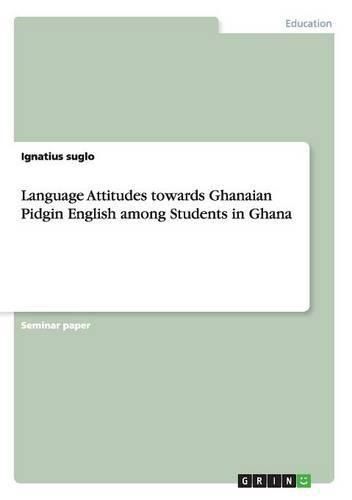Readings Newsletter
Become a Readings Member to make your shopping experience even easier.
Sign in or sign up for free!
You’re not far away from qualifying for FREE standard shipping within Australia
You’ve qualified for FREE standard shipping within Australia
The cart is loading…






Seminar paper from the year 2012 in the subject English - Pedagogy, Didactics, Literature Studies, grade: 15, Justus-Liebig-University Giessen, course: English in Africa, language: English, abstract: Language attitudes are the feelings people have about their own language or the language(s) of others. Daily, we tend to form our opinions about others from the way they speak. Our attitudes to different varieties of a language colour the way we perceive the individuals that use those varieties. In the Ghanaian society, there are basically two distinct varieties of English besides the standard Received Pronunciation (RP) and American English; these are the Standard Ghanaian English and GhaPE. The social distinction for the users of these varieties has for a long time been educational status. Whereas StGhaE was associated with the educated, the non- standard, GhaPE was associated with the uneducated class of the society, who were often seen as a class that struggled to express themselves in English against all odds. Observing the Ghanaian society today, there seem to be a gradual attitudinal change especially among students in the second cycle and tertiary institutions towards the perceived non-standard of English, Pidgin. Pidgin English has been seen as a preserve of the uneducated and frowned upon by the schooled class. Recent development, however, shows the active use of a variety of Pidgin among students in Ghana. Huber terms it as an educated variety of Pidgin1 which he distinguishes from the uneducated variety, while Dako (2002) calls it Student Pidgin.
$9.00 standard shipping within Australia
FREE standard shipping within Australia for orders over $100.00
Express & International shipping calculated at checkout
Seminar paper from the year 2012 in the subject English - Pedagogy, Didactics, Literature Studies, grade: 15, Justus-Liebig-University Giessen, course: English in Africa, language: English, abstract: Language attitudes are the feelings people have about their own language or the language(s) of others. Daily, we tend to form our opinions about others from the way they speak. Our attitudes to different varieties of a language colour the way we perceive the individuals that use those varieties. In the Ghanaian society, there are basically two distinct varieties of English besides the standard Received Pronunciation (RP) and American English; these are the Standard Ghanaian English and GhaPE. The social distinction for the users of these varieties has for a long time been educational status. Whereas StGhaE was associated with the educated, the non- standard, GhaPE was associated with the uneducated class of the society, who were often seen as a class that struggled to express themselves in English against all odds. Observing the Ghanaian society today, there seem to be a gradual attitudinal change especially among students in the second cycle and tertiary institutions towards the perceived non-standard of English, Pidgin. Pidgin English has been seen as a preserve of the uneducated and frowned upon by the schooled class. Recent development, however, shows the active use of a variety of Pidgin among students in Ghana. Huber terms it as an educated variety of Pidgin1 which he distinguishes from the uneducated variety, while Dako (2002) calls it Student Pidgin.